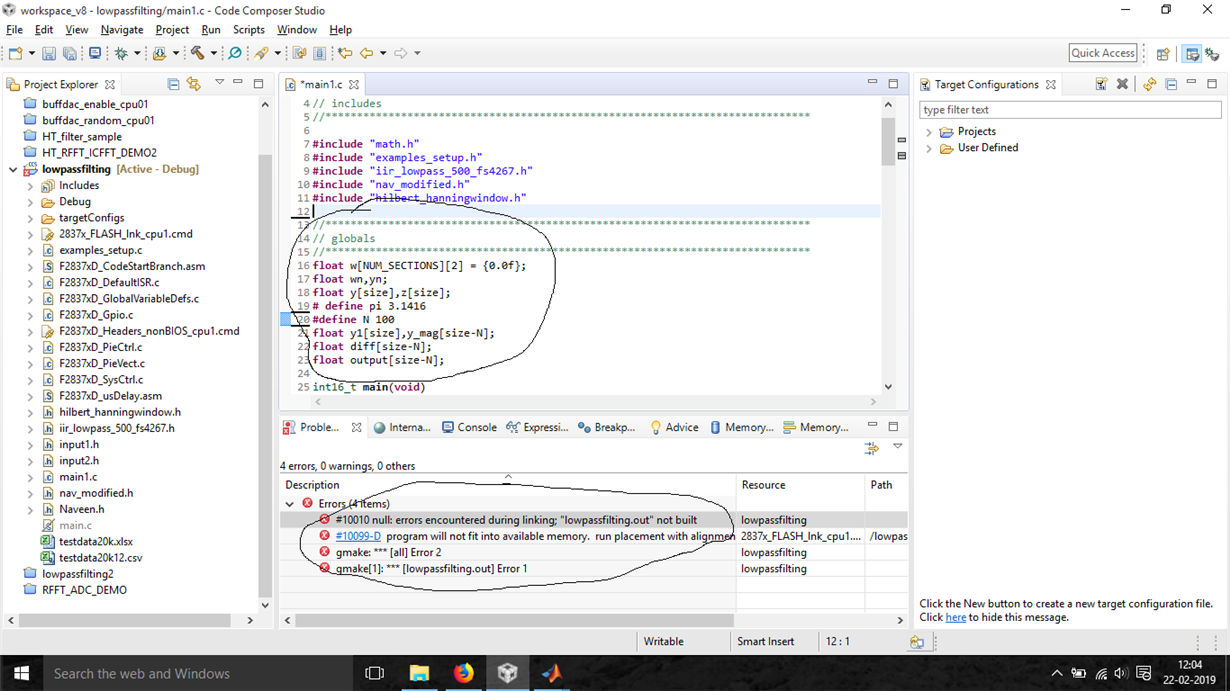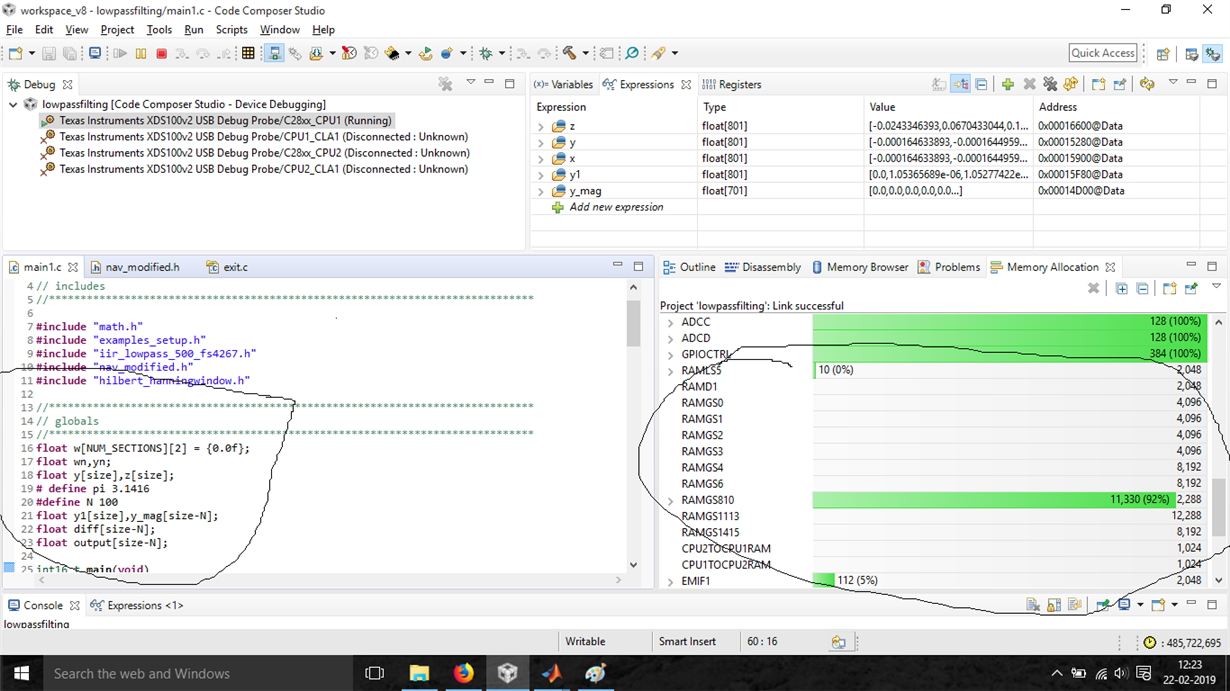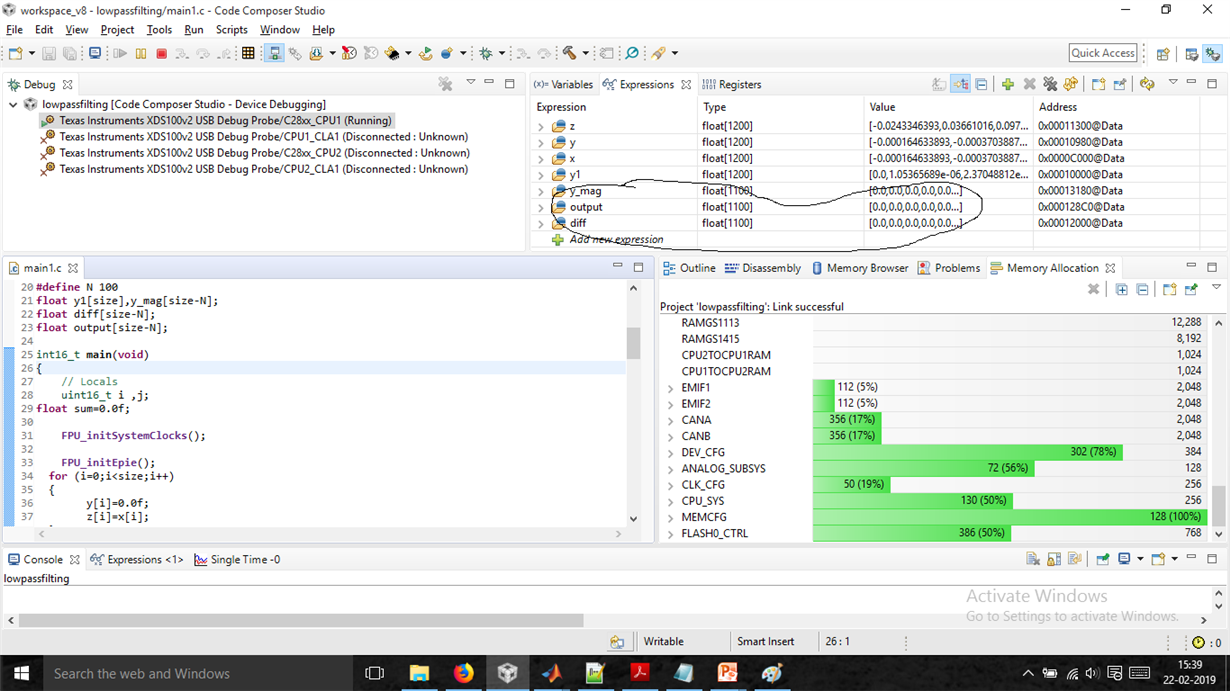Tool/software: Code Composer Studio
My RAM Memory completely assigned by global variables .Here, I modified my linker file to take care of gloabal variables. The problem i faced when i increase the code length ( program using different varibles are more then I defined every variable as a global). Here I considered the two cases
case 1:
#define size 1200
#define size1 100
problem: I am facing the linker file problem
case 2:
#define size 801
#define size1 100
Case2: I didn't found any linker problem, and noticed that my RAM blocks most are empty only. Here, I am attaching the linker files and result for case2.
Questions:
1. What should i change to use effectively RAM blocks.
2. Is there any possibility of storing global variables in flash? Please elaborate the way how to do it?
LInker file:
MEMORY
{
PAGE 0 : /* Program Memory */
/* Memory (RAM/FLASH) blocks can be moved to PAGE1 for data allocation */
/* BEGIN is used for the "boot to Flash" bootloader mode */
BEGIN : origin = 0x080000, length = 0x000002
RAMM0 : origin = 0x000122, length = 0x0002DE
RAMD0 : origin = 0x00B000, length = 0x000800
RAMLS0 : origin = 0x008000, length = 0x000800
RAMLS1 : origin = 0x008800, length = 0x000800
RAMLS2 : origin = 0x009000, length = 0x000800
RAMLS3 : origin = 0x009800, length = 0x000800
RAMLS4 : origin = 0x00A000, length = 0x000800
//RAMGS14 : origin = 0x01A000, length = 0x001000
//RAMGS15 : origin = 0x01B000, length = 0x001000
RESET : origin = 0x3FFFC0, length = 0x000002
/* Flash sectors */
FLASHA : origin = 0x080002, length = 0x001FFE /* on-chip Flash */
FLASHB : origin = 0x082000, length = 0x002000 /* on-chip Flash */
FLASHC : origin = 0x084000, length = 0x002000 /* on-chip Flash */
FLASHD : origin = 0x086000, length = 0x002000 /* on-chip Flash */
FLASHE : origin = 0x088000, length = 0x008000 /* on-chip Flash */
FLASHF : origin = 0x090000, length = 0x008000 /* on-chip Flash */
FLASHG : origin = 0x098000, length = 0x008000 /* on-chip Flash */
FLASHH : origin = 0x0A0000, length = 0x008000 /* on-chip Flash */
FLASHI : origin = 0x0A8000, length = 0x008000 /* on-chip Flash */
FLASHJ : origin = 0x0B0000, length = 0x008000 /* on-chip Flash */
FLASHK : origin = 0x0B8000, length = 0x002000 /* on-chip Flash */
FLASHL : origin = 0x0BA000, length = 0x002000 /* on-chip Flash */
FLASHM : origin = 0x0BC000, length = 0x002000 /* on-chip Flash */
FLASHN : origin = 0x0BE000, length = 0x002000 /* on-chip Flash */
PAGE 1 : /* Data Memory */
/* Memory (RAM/FLASH) blocks can be moved to PAGE0 for program allocation */
BOOT_RSVD : origin = 0x000002, length = 0x000120 /* Part of M0, BOOT rom will use this for stack */
RAMM1 : origin = 0x000400, length = 0x000400 /* on-chip RAM block M1 */
RAMD1 : origin = 0x00B800, length = 0x000800
RAMLS5 : origin = 0x00A800, length = 0x000800
RAMGS0 : origin = 0x00C000, length = 0x001000
RAMGS1 : origin = 0x00D000, length = 0x001000
RAMGS2 : origin = 0x00E000, length = 0x001000
RAMGS3 : origin = 0x00F000, length = 0x001000
RAMGS4 : origin = 0x010000, length = 0x002000
// RAMGS5 : origin = 0x011000, length = 0x001000
RAMGS6 : origin = 0x012000, length = 0x002000
//RAMGS7 : origin = 0x013000, length = 0x001000
RAMGS810 : origin = 0x014000, length = 0x003000
RAMGS1113 : origin = 0x017000, length = 0x003000
RAMGS1415 : origin = 0x01A000, length = 0x002000
CPU2TOCPU1RAM : origin = 0x03F800, length = 0x000400
CPU1TOCPU2RAM : origin = 0x03FC00, length = 0x000400
}
SECTIONS
{
/* Allocate program areas: */
codestart : > BEGIN PAGE = 0
.cinit : > FLASHB |FLASHE |FLASHJ PAGE = 0
.pinit : > FLASHB, PAGE = 0
.text : >> FLASHB | FLASHC PAGE = 0
.TI.ramfunc : {} LOAD = FLASHD,
RUN = RAMLS0 | RAMLS1 | RAMLS2 |RAMLS3,
LOAD_START(_RamfuncsLoadStart),
LOAD_SIZE(_RamfuncsLoadSize),
LOAD_END(_RamfuncsLoadEnd),
RUN_START(_RamfuncsRunStart),
RUN_SIZE(_RamfuncsRunSize),
RUN_END(_RamfuncsRunEnd),
PAGE = 0, ALIGN(4)
/* Allocate uninitalized data sections: */
.stack : > RAMM1 PAGE = 1
.ebss : >> RAMLS5 | RAMGS0 | RAMGS4 | RAMGS6 | RAMGS810 | RAMGS1113 |RAMGS1415 PAGE = 1
.esysmem : > RAMLS5 PAGE = 1
/* Initalized sections go in Flash */
.econst : >> FLASHF | FLASHG | FLASHH PAGE = 0
.switch : > FLASHB PAGE = 0
.reset : > RESET, PAGE = 0, TYPE = DSECT /* not used, */
Filter_RegsFile : > RAMGS0, PAGE = 1
SHARERAMGS0 : > RAMGS0, PAGE = 1
SHARERAMGS1 : > RAMGS1, PAGE = 1
/* The following section definitions are required when using the IPC API Drivers */
GROUP : > CPU1TOCPU2RAM, PAGE = 1
{
PUTBUFFER
PUTWRITEIDX
GETREADIDX
}
GROUP : > CPU2TOCPU1RAM, PAGE = 1
{
GETBUFFER : TYPE = DSECT
GETWRITEIDX : TYPE = DSECT
PUTREADIDX : TYPE = DSECT
}
}
/*
//===========================================================================
// End of file.
//===========================================================================
*/




